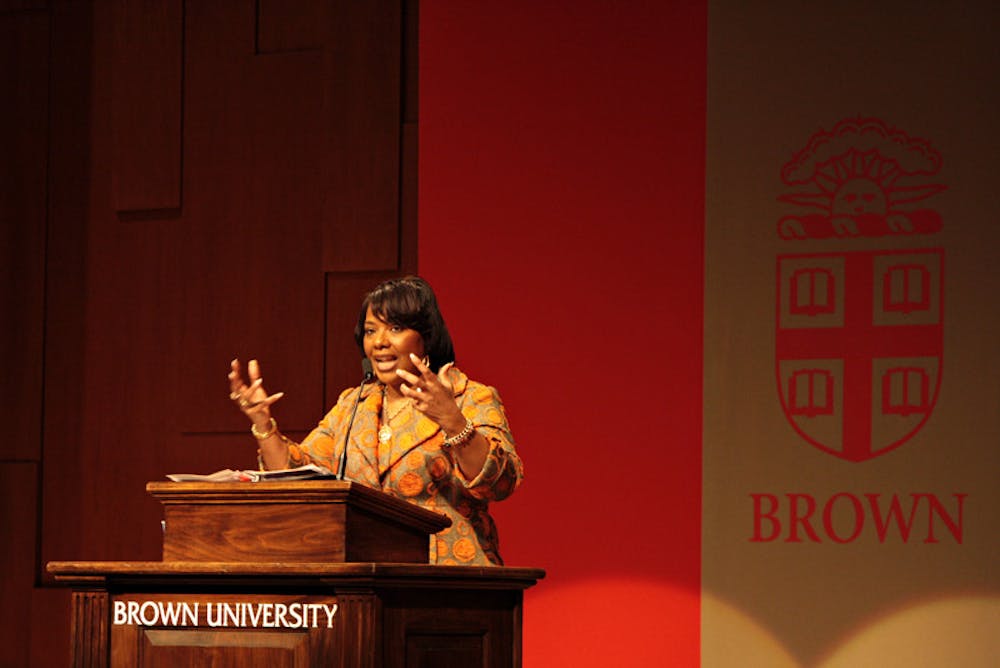Bernice King, CEO of the Martin Luther King, Jr. Center for Nonviolent Social Change, delivered a rousing speech to a packed De Ciccio Family Auditorium in the Salomon Center for the 16th annual Martin Luther King, Jr. Lecture yesterday afternoon. The talk, titled “Advancing the ‘Dream’: Addressing Social Equity Issues to Eliminate Health Disparities in the 21st Century,” focused extensively on the legacies of her parents, Coretta Scott King and Martin Luther King, Jr.
In addition to members of the Brown community, representatives from the Center for Disease Control and several other universities were in attendance.
Beginning with a video montage of different speakers reading from Martin Luther King, Jr.’s “Letter from Birmingham Jail,” the introduction also included a performance by the Shades of Brown a cappella group. In opening remarks, Associate Provost for Academic Development and Diversity Liza Cariaga-Lo, President Christina Paxson and Provost Mark Schlissel P’15 addressed the idea that despite progress in reducing racial inequality, much work remains to be done.
When King took the podium, she began with a eulogy for her mother, who passed away seven years ago yesterday. “(My mother) is often lost in the equation when we talk about Martin Luther King,” she said. “When my father died in 1968, he was one of the most hated men in America, and today, he is one of the most loved men in the world.” King credited the shift in public perception to her mother’s efforts to establish the King Center and a federal holiday in his name.
King’s remarks centered on the theme of unity between all races. “I believe we are all related, and we are all a little dysfunctional,” she said, noting that humans share 99 percent of their DNA.
King spent the rest of her speech discussing issues of health care and poverty. She called health issues the most harmful form of racial inequality.
“Not all communities have benefited” from medical advancements, King said, noting the high concentration of convenience stores, fast food restaurants and liquor stores in impoverished neighborhoods. She referenced statistics showing racial disparities in medical issues like HIV, substance abuse and stress and social issues like incarceration, education, employment and internet access.
King identified poverty as the underlying social issue that policy should address. “We must escalate the war on poverty wherever it occurs,” she said.
King’s parents believed health care should be universal, she said. King commended the 2010 Patient Protection and Affordable Care Act but said it did not go far enough. “We must set higher standards,” she said.
King also discussed recent mass shootings, calling violence a large public health problem. She said she supports bans on assault weapons and high-capacity ammunition and shared an anecdote from her childhood. After her house was bombed in an assassination attempt on her father, he calmed an armed mob seeking revenge for the attack, saying, “We are going to fight this another way because he who lives by the sword will perish by the sword.”
She suggested restricting violent media including video games, likening them to sugary products that parents should limit in their child’s diet.
King concluded with the final line from her father’s “I Have a Dream” speech: “Free at last, free at last, thank God Almighty, we are free at last.”
King’s speech was followed by a question-and-answer period, a significant portion of which King spent addressing her views on gay and lesbian equality. King said though she does not hate the LGBTQ community, her first responsibility is to her religious views. “The family was created and ordained first and foremost by God,” she said. King has publicly opposed gay marriage in the past, a point on which she said she disagreed with her mother. During her answer, King said many people are gay if they “delved into it as an experiment,” though some are gay due to a “genuine birthing experience.”
The event concluded with a performance of “Swing Low, Sweet Chariot” by Shades of Brown.

ADVERTISEMENT




